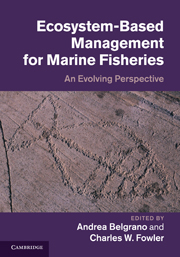Book contents
- Frontmatter
- Contents
- List of contributors
- Foreword
- Acknowledgments for cover artwork
- Introduction
- PART I CURRENT FORMS OF MANAGEMENT
- PART II ELEMENTS OF IMPORTANCE TO MANAGEMENT
- PART III USING PATTERNS
- 10 Science and management: systemically matching the questions
- 11 Sustainability, ecosystems, and fishery management
- 12 On the path to holistic management: ecosystem-based management in marine systems
- Afterword
- Index
- Plate section
12 - On the path to holistic management: ecosystem-based management in marine systems
from PART III - USING PATTERNS
Published online by Cambridge University Press: 17 February 2011
- Frontmatter
- Contents
- List of contributors
- Foreword
- Acknowledgments for cover artwork
- Introduction
- PART I CURRENT FORMS OF MANAGEMENT
- PART II ELEMENTS OF IMPORTANCE TO MANAGEMENT
- PART III USING PATTERNS
- 10 Science and management: systemically matching the questions
- 11 Sustainability, ecosystems, and fishery management
- 12 On the path to holistic management: ecosystem-based management in marine systems
- Afterword
- Index
- Plate section
Summary
Abstract
Overfishing based on past management practices, combined with growing awareness of the complexity of the systems of which we are a part has motivated work toward management that is more holistic in its perspective. This book is a contribution to, and documentation of, progress being realized. It includes projections for significant next steps.
Progress certainly involves attention to marine ecosystems. We need to manage our harvests from populations of fish with an approach that is ecosystem based. Partial progress involves knowing the need for sustainability in harvests taken from groups of species, including the populations of species that are components of ecosystems. It is important that such harvests be taken with an approach that is ecosystem based. More progress involves knowing that harvests of biomass taken from ecosystems need to be sustainable. These also must be taken with an approach that is ecosystem based. We are only now beginning to see that, not only must harvests be ecosystem based, they must also be evosystem based. This is necessary to account for both ecological complexity and the complexity of evolutionary and coevolutionary impacts of fishing throughout the systems affected. Progress involves knowing that both ecosystems and evosystems are parts of the biosphere; holistic management must also be biosphere based in all of its applications so the harvests, the biosphere, and all ecosystems are sustainable.
The chapters of this book present a rich array of information and thinking that contributes to the principles upon which holistic management can be based.
- Type
- Chapter
- Information
- Ecosystem Based Management for Marine FisheriesAn Evolving Perspective, pp. 337 - 356Publisher: Cambridge University PressPrint publication year: 2011
- 2
- Cited by

